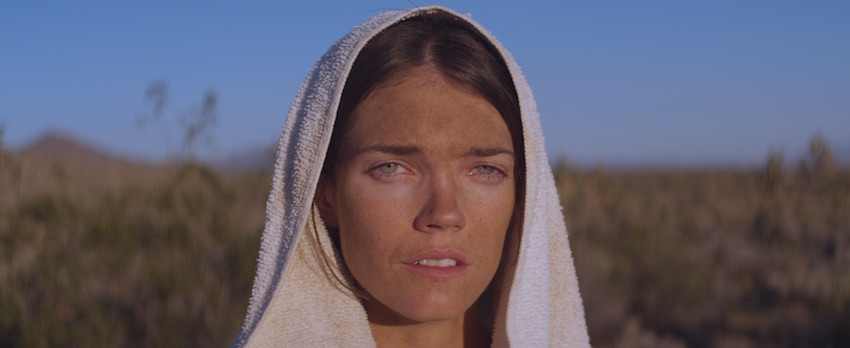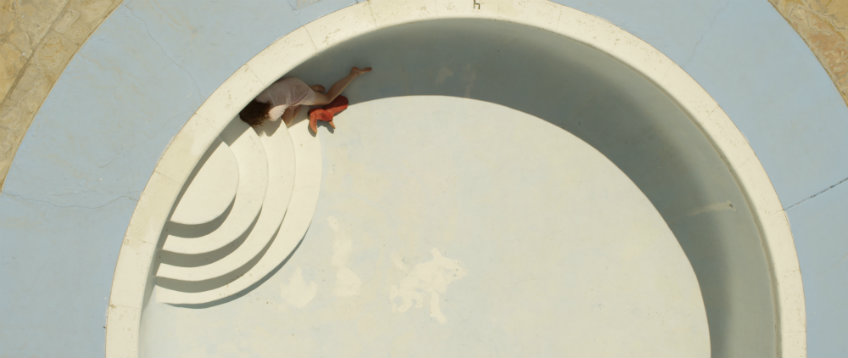Movements in the Desert: an Interview with Celia Rowlson-Hall

Jessica Ellicott, Critics Campus 2016
There’s something quite remarkable about choreographer-turned-filmmaker Celia Rowlson-Hall’s debut feature, Ma. It’s a playful feminist take on an old Bible story, transplanting the Virgin Mary amongst the motels and cacti of of the American Southwest. Told entirely through movement, with Rowlson-Hall in the starring role, Ma pushes the boundaries of storytelling on screen.
Jessica Ellicott: Your film is dialogue-free. How did you go about developing the script?
Celia Rowlson-Hall: Basically, I first wrote the story out as a narrative – you know, “Once upon a time Ma emerged,” and I wrote how each scene was going to play out visually. Then, once I had the story, I readapted it into script form. And, since there’s no dialogue, it’s just lines of action really, so the entire script is something like 27 pages. It’s such a short script, because, for example, the dance that Ma does before she transforms into Daniel is a five-minute scene in the film, and it was one sentence in the script, because it says “Ma does the dying swan dance.”
JE: The film opens with the question “Who can find a virtuous woman?” But it seems to me that Ma’s journey is about her search for virtue in a virtueless world.
Yeah, that’s funny, I’ve never been asked this. The point is, for me in my life, I still have these really strong traces in my body of wanting to be a virtuous person. And wanting to be the best person possible, to the point where you give up your own self-protection to be good or be seen for others. So, it’s like, where’s the line of martyrdom and self-protection? It’s funny, because I had a screening in Washington state. It was a bunch of 70-year-old hippies watching it, and when that question popped up, people started to laugh. Because there’s actually no such thing as a virtuous woman.
It’s a death wish, in a way. We don’t ask for virtuous men, and the same thing is happening now with Hillary Clinton. Everyone thinks she’s a liar, when her opponent is a liar. And we don’t question that. There’s this idealised perfection around women that cripples us.

JE: Ma reminded me of female-driven road movies like Scorsese’s Alice Doesn’t Live Here Anymore – or even Showgirls, with Ma hitchhiking her way to Las Vegas. What were some of your inspirations?
CR-H: I would say most of my inspirations actually came from choreographers like Pina Bausch; she’s a huge inspiration for me. I remember sharing the script with a friend and him saying, “Wow, this really reminds me of Wim Wenders’s Paris, Texas.” And so when I watched it, it was crazy – because I watched it two weeks before we were about to shoot, and there were weirdly similar sequences. And instead of freaking out and trying to change things, I said, “Well, then, this movie is my spirit animal.” And what I really like about that film is that it very much takes its time, and it reminded me that I want to take my time. It’s funny, because Wim Wenders made that in 1984 and then made Pina in 2011, so I look at those two films as these bookends of inspiration for Ma.
And Shirin Neshat – she’s an inspiration to me because of her use of landscape and proximity of characters in space to the camera. She has this amazing piece where she has something like a hundred women in burqas coming across a beach, and it takes twelve minutes for them to get there. Just her use of time and imagery. I also really love Yorgos Lanthimos and how he creates these very specific rules of the world that all of the characters operate inside.
JE: Something that struck me was how strong a presence the desert is in the film. What drew you to the desert in particular?
CR-H: A couple of things. I think when we think of America and Americana, we think of the American Southwest and of cowboy and Indian movies, and the land that was yet to be discovered – even though it was already discovered by the native Americans. I wanted it to have the style of a western. Also, the desert looks uninhabitable, so for Ma to emerge from the desert, there’s something about her character having to survive. The desert is so fascinating because it looks so desolate and lifeless, and then you dive in a little closer and you realise it’s brimming with all sorts of life and texture.

JE: There aren’t many films like Ma. Is that something that inspires you – to do something that hasn’t been done before?
CR-H: I think, coming from the dance world and then finding this new love of film and this new medium through which to express dance, I find it an honour and a joy to be able to bring dance to this platform, and in ways that make dance the primary language. Dance is very much secondary in most stories: how in music videos you’ve got the dancers in the background, or how in musicals they’re singing and dancing, but it’s never dance as the language. I want to continue creating work where movement and dance is the language through which we receive the story.
JE: I’ve heard you talk about there only being about a paragraph dedicated to Mary in the Bible, so you really had to extrapolate.
CR-H: Yeah. I grew up quite religious, and everything is based on what Jesus did. And so, when I was little I wanted to be Jesus. I was like, “It seems like a great idea. I want to heal people, I don’t want there to be death, I don’t want there to be sickness.” I would freak out as a kid if I saw something suffering. I hated that I didn’t have any kind of control over it.
A couple of years later I realised, “Oh my gosh, I can’t be Jesus because I’m a girl, so I can be Mary, and I can bring forth the baby boy.” And it’s like she came out of nowhere. Joseph believed her that she was a virgin. They had a child, he grew up. Then I just clung onto the obsession with virginity, and that holding onto that purity is what can bring forth this being.
JE: I’m trying to think who I wanted to be as a kid. I don’t think it was Jesus.
CR-H: Generally people are like, “Firefighter, lawyer …”
JE: I think it was Pocahontas.
CR-H: That’s a great one. You’re in nature, you’ve got a terrible ending.
JE: A nice love story …
CR-H: Exactly.